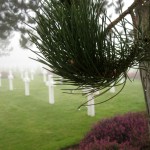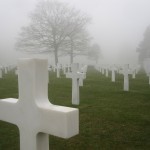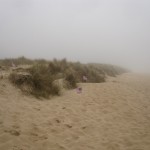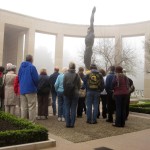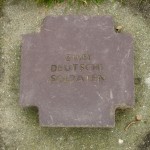If you listen, you can hear the sea anywhere in the cemetery. From Omaha Beach, a few dozen meters away, the water’s deep rushing breath is the undertone of the American Military Cemetery in Normandy, France. Here lie the graves of almost 10,000 Americans who died during our entrance into World War II on D-Day.
This was the second time I had visited the cemetery. Both times it was covered in thick fog. But this weekend it was so thick as to limit visibility to around 15 yards, and it was piercingly frigid, but I wouldn’t have had it any other way. Perhaps I’m a hopelessly dramatic person, but it seemed like the right way to see Omaha Beach and the American Cemetery there. It was haunting and terrible and powerful.
After getting off of our bus, we dispersed through the cemetery, and I made my way to the memorial at its head. I mounted the steps, and turned around to see the mists swirl around the first rows of graves—the only ones I could see. Turning into the memorial, I looked up at a map of the D-Day assault by the British, Canadians, and Americans.
A woman with a cane and white curly hair approached me. She might have been in her late 60s or early 70s. “My father was there,” she said. Then, in case I was French and hadn’t understood, she pointed her cane at the map and clarified: “Mon père.” I looked up at the imposing map set into the marble or granite or whatever regal stone it was, and didn’t know what to say.
“Have you been here before?” I asked. She seemed happy enough to find I was an American, and said this was her first time. She asked where I was from. She was from the east coast, though I didn’t need to ask. It was clear when she said words like “Father.”
“I wanted to take him here, but he passed away. You know, everyone told me, before I came here, that the French hate Americans. But they have been very kind. They keep this place up very nice.” I think it’s actually us who keep up the cemetery, but I didn’t say anything.
There was a group visiting, and their leader started the national anthem playing, at which point the woman excused herself. I understood why. As I listened to The Star Spangled Banner, my eyes became quite as moist as the foggy cemetery they beheld. When it was finished, I decided to walk down to the beach that had once born the footprints of this woman’s father.
I could hear the English Channel long before I could see it, hidden as it was in the fog. Taking a path from the memorial, I descended some stairs and expected to soon see the beach, but no beach. It was odd because the water sounded so close. It was like it was coming out of the very fog before me, but in fact I had to descend a good 15 minutes down a winding path before reaching the first dunes.
Sprinkled along the beach were American flags. I didn’t really feel patriotic though. Just sad. I watched the waves brush the sands again and again, the same waters and the same sands that drank the blood of thousands of soldiers more than a half century ago. And yet, while it was an American cemetery we visited, with American flags stuck everywhere in the beach nearby, I don’t think the sand knew any different. Spilled blood has no nationality.
A few hours later, we visited the German WWII cemetery in France, not far away. But when we arrived, my mind lashed out, “why?” I was not defensive or nationalistic at the American cemetery, but now I was. I had just cried at the graves of Americans, who were killed by the inhabitants of these German graves. But I was still missing the point. The disgusting thing about war isn’t the death of Americans. It’s the death of people. These Germans were convinced of a need to fight, of a need to win that was largely cultivated by the conditions in which they were left by the victors of WWI. The point isn’t that some people were good and some people were evil, the point is that evil is whatever drives us to kill and destroy one another.
So, I’m glad that our visit finished at the German cemetery, because it helped me remember the cost of war. War costs people. This is a disgusting way to say so, and I mean it to be. It is the universal, unavoidable price of war. But at the end of a war, each side must bury their dead. And when that day comes, the ground knows no difference between them. The sand knows no difference. The inexorable waves of Omaha Beach know no difference.
And the only difference between the cemeteries are the stones above the graves.
[For more information on the American Cemetery, click here. For a recap of some of the D-Day information we learned this weekend, check out here.]
